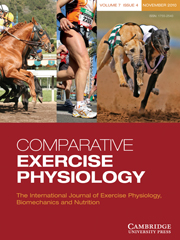Article contents
Effects of trait anxiety and direction of pre-competitive arousal on performance in the equestrian disciplines of dressage, showjumping and eventing
Published online by Cambridge University Press: 05 May 2011
Abstract
Recent research has shown that more successful performers interpret pre-competitive symptoms of anxiety as more facilitative than less successful performers. The aim of the study was to examine the effect of both trait anxiety and pre-competitive arousal intensity and direction on intermediate riding performance in the disciplines of dressage, showjumping and eventing, including whether differences exist between male and female riders. Sixty-two German equestrian riders competing in the equestrian disciplines of dressage (N = 21), showjumping (N = 25) and eventing (N = 16) were asked to complete a revised version of the ‘Wettkampf–Angst-Inventar-State’, which included directional scales for all items and the ‘Wettkampf–Angst-Inventar-Trait’ prior to competing. Final placings were used as performance indicators. Most important findings revealed that the correlation between direction of somatic state arousal and competitive placing was nearing significance (rs = − 0.23, P =0.07) and loss of focus was positively correlated to competitive placing (rs = 0.26, P < 0.05). Conclusions may be drawn that in equestrian sports positive interpretation of physical symptoms of arousal as well as the ability to remain focused on the task at hand may lead to more successful ridden performance.
- Type
- Research Paper
- Information
- Copyright
- Copyright © Cambridge University Press 2011
References
- 10
- Cited by


